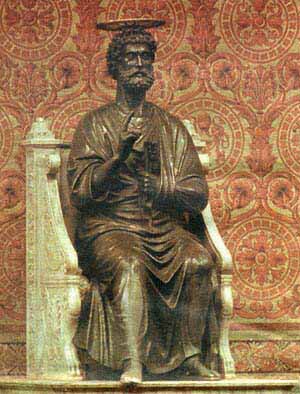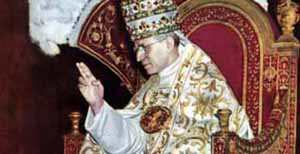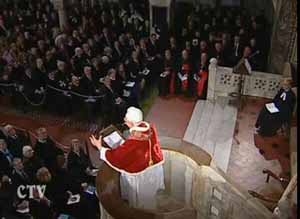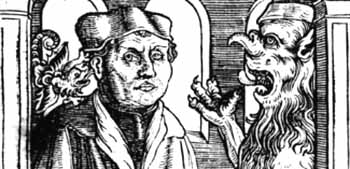 |
About the Church
The Infallibility of the Church - I
Infallibility: First Requisite
to Accomplish Christ’s Mandate
Fr. Leonel Franca, S.J.
The Church is the extension of Christ in History. Thousands of years preceded the coming of the Redeemer. During that long, difficult period of preparation, God spoke to man through His Prophets. But His teachings, confided to the exclusive custody of one small people, did not irradiate their divine light over the rest of mankind, which marched inexorably toward the abyss in the darkness of their ignorance and moral vice.

When the Pope speaks ex cathedra he exercises the infallibility of Peter |
Finally God sent us His Son: “In these last days He has spoken to us by His Son” (Heb 1:2). After a long dawn, the Divine Sun came to give light and life to all mankind. The focus of light and truth, the center of life and love, Christ, the God-Man, brings together all the rays of the past, concentrates them in Himself and projects them over future generations: “I am the way, the truth and the life.”
It was not human lips that spoke this divine phrase. In Christ it was Divinity who spoke, dressed in the mantle of our human nature. From His lips man received the treasures of truth and the seeds of life that would allow him to achieve his supernatural destiny. Behold the mission of Christ.
After the life of the Redeemer ended, however, how would those rays of truth live on to enlighten the minds of all men? Through what channels would the waves of that divine life flow to vivify hearts? Who could keep the light of that divine torch burning bright and uncontaminated?
Every divine work has a harmonic plan with a fundamental unity. In the natural order God uses men to transmit life from one generation to another. Likewise, it is by means of men’s words that the patrimony of truth is transmitted from one generation to the next.
In the supernatural order, Christ also chose men to continue His divine mission. At Calvary, the blood of the Divine Victim re-established the bonds of filial adoption that Adam had broken in Eden. A new supernatural order was founded that needed to be conserved by a divine government whose laws would make its existence perpetual and ensure its development and perfection. There is a great harmony in this divine plan.
During His mortal life Christ gathered around Him a handful of men, polished their rudeness, instructed them for three years, ordained them priests, promised them His Spirit and, finally, invested them with a great mission: “All power was given to Me on heaven and earth. As the Father sent me, I send you, go and teach all peoples.” The Church was founded: a human, visible and spiritual society of the children of the Redemption.

Only the Catholic Church can discern the true meaning of Scriptures |
As the organ that transmits and perpetuates the work of the Man-God, the Church must also have everything necessary to accomplish the divine mission confided to her. The first requirement for this is her doctrinal infallibility.
If the Church were subject to err, she could have adulterated the deposit of the truth along the centuries and frustrated the illuminating function of the Sun of souls. Instead of a diaphanous, crystalline atmosphere that would transmit the vivifying rays of that Sun, a dark cloud, dense and opaque, could intervene and stand in the way of human minds and the focus of eternal light.
An immutable dogma necessarily demands infallibility to maintain it. Without the promise of divine assistance, no human being can say to others: "You must think and believe as I do."
Protestants object: “But we have the absolute certainty of arriving at the genuine doctrine of the Savior without the Catholic Church, We have it in the word of the Gospel.”
Without the infallible authority of the Church, how could one discern the authentic Gospels from the great number of apocryphal gospels that abounded in the first centuries of Christianity? It was not possible. For the Church it was possible to know because she was not founded upon the Gospel; she existed before those written words and could well discern which ones were authentic. Indeed, the Gospels were written for the Church and were confided to her custody.

Denying 500 years of Church history, Benedict XVI preached in a Protestant temple in Rome |
But, for argument sake, let us suppose the Protestants could say that they had the authentic canonical books and the pure word of God without the Church. This is still not enough. It is necessary to interpret it authentically to understand its genuine meaning. If Protestants lend a different sense to a phrase than what was intended by the Divine Author, then they do not believe in the doctrine of Christ, but in their own interpretation. And human interpretation is always fallible.
Human history is the history of human instability. It is the history of fluctuating changes in all philosophical ideas and religious creeds. In human history, the most obvious principles of common sense have been contested, the most elementary truths have been denied. Nothing resists the storms raised by human ignorance and passions. Where there is no center of unity, where an infallible authority is not present, each man feels free to give his own opinion, each scholar can establish his own chair and found his own school. With this, a lack of doctrinal unity becomes inevitable.
When a doctrine is practical and its precepts touch every aspect of life – conquering greed, mortifying sensuality, humiliating pride – it raises a general uproar against it. However, no truth is able to defend itself by itself. It must have a vigilant and incorruptible sentinel close to it to defend it from attacks, conserve its life and assure its efficacy.
No human legislator leaves his laws to the caprices of individual interpretation. Even though they are simpler and more concrete than spiritual laws, human laws have a body of magistrates to explain and protect them. Similarly, the evangelical law needs the Catholic Church to defend it, apply it and conserve it. This mission of the Church is divinely assisted in order to guard the treasury of truth from any error or evil.

Luther, inspired by devils to enunciate his theory of free examination of Scriptures |
Once infallibility is denied, each individual who reads and interprets the Gospel becomes free to claim his own “infallibility.” This is exactly what Luther did: “It falls to all Christians and to each Christian individually to know and judge doctrine.” (1)
How can such a paradox be defended? In fact, to the same text Luther gives one interpretation, Calvin another, Melanchthon another, Zwingli still another, Carlstadt another, Bucero another, the Anglicans another, the Quakers another, and so on for each one of the thousands of Protestant sects. (2) Are they all infallible? Which one is the truth? Was this religious Babel what Christ intended when He delivered His word to the world?
There is no way to avoid the need for an infallible authority to guard and maintain the divine deposit in order to ensure its supernatural integrity. An infallible book is worth nothing in the hands of fallible men who freely interpret it.
1. Martin Luther, Werke, Weimar, Kritische Gesamtausgabe, 1883-1914, vol. X, 2 Abt. p. 217; cf. vol. XL, p. 236. (This critical edition contains 50 volumes and will be cited henceforth as Weimar).
2. Already in 1577, in a dissertation published in Ingolstadt, Christopher Rasperger identified 200 different interpretations proposed by Protestants of the words: Hoc est corpus meum.

Summarized and translated by the TIA desk from Leonel Franca,
A Igreja, a Reforma e a Civilização, Rio: Livraria Catholica, 1928, pp. 134-139.
Posted September 22, 2010

Related Topics of Interest
 Thy Will Be Done, on Earth as It Is In Heaven Thy Will Be Done, on Earth as It Is In Heaven
 St. Paul's Teaching on Facing False Teachers of Doctrine St. Paul's Teaching on Facing False Teachers of Doctrine
 Marvelous Continuity and Shocking Change Marvelous Continuity and Shocking Change
 Newman against Papal Infallibility Newman against Papal Infallibility
 Dogmas Change Based on 'Intense Feelings' Dogmas Change Based on 'Intense Feelings'
 How Should a Catholic Act before Bad Popes? How Should a Catholic Act before Bad Popes?

Related Works of Interest
|
About the Church | Home | Books | CDs | Search | Contact Us | Donate

© 2002-
Tradition in Action, Inc. All Rights Reserved
|
 |
|